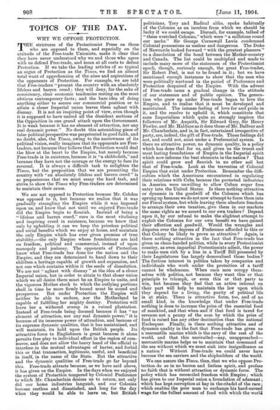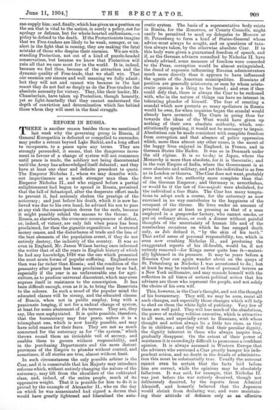WHY WE OPPOSE PROTECTION. T in strictures of the Protectionist Press
on those who are opposed to them, and especially on the attitude of the Free-trade Unionists, make it clear that they have never understood why we and those who agree with us defend Free-trade, and mean at all costs to defeat Protection. If we take the leading articles of so typical an organ of Protection as the Times, we find an almost total want of apprehension of the aims and aspirations of • the opponents of Protection. For example, we are told that Free-traders "present the country with an absolutely lifeless and barren creed ; they will deny, for the sake of consistency, clear economic tendencies resting on the most obvious contemporary facts ; and the bare idea of doing anything either to secure our commercial position or to attain a closer Imperial union leaves them aghast with dismay. It is not an inspiring point of view, even though it is supposed to have united all the dissident sections of the Opposition in one grand attack upon the Government. It is weak because it has, no element of attraction, nor any real dynamic power." No doubt this astonishing piece of false political perspective was perpetrated in good faith, and no doubt, also, the Times, owing to the narrowness of its political vision, really imagines that its opponents are Free- traders, not because they believe that Protection would deal the blow at the heart to the Empire, but merely because Free-trade is in existence, because it is "a shibboleth," and because they have not the courage or the energy to face its reversal. It is always a difficult task to enlighten the Times, but the proposition that we are presenting the country with "an absolutely lifeless and barren creed" is so preposterous that we must essay the hard task, and strive to show the Times why Free-traders are determined to maintain their cause.
We are not opposed to Protection because Mr. Cobden was opposed to it, but because we realise that it was gradually strangling the Empire while it was imposed upon us, and know that not until we enjoyed Free-trade did the Empire begin to flourish. Instead of being a "lifeless and barren creed," ours is the most vitalising and inspiring creed in existence, because we know that only by upholding it can we keep the priceless political and social benefits which we enjoy at home, and maintain the only Empire which has ever given promise of true stability,—the only Empire whose foundations are laid on freedom, political and commercial, instead of upon monopoly and jealousy. The opponents of Protection know what Free-trade has done for the nation and the Empire, and they are determined to hand down to their children a heritage capable of growth and expansion; and not one which contains within it the seeds of dissolution. We are not "aghast with dismay" at the idea of a. closer Imperial union, but in order to attain to that closer union .which we all desire there must be an Empire to unite, and the vigorous Mother stock to which the outlying portions shall.in time be more firmly bound must be sound and prosperous. But under Protection the Empire will neither be able to endure, nor the Motherland be capable of fulfilling her mighty destiny. Protection will leave her a withered stump in a ruined plantation. Instead of Free-trade being doomed because it has "no element of attraction, nor any real dynamic power," it is because of its immense power of attraction, and because of its supreme dynamic qualities, that it has maintained, and will maintain, its hold upon the British people. Its attractive force to Englishmen is great because it alone permits free play to individual effort in the region of com- merce, and does not allow the heavy hand of the official to interfere in the mutual advantages of barter, and forbid this or that transaction, legitimate, useful, and beneficial in itself, in the name of the State. But the attractive and the dynamic qualities of Free-trade go far beyond this. Free-trade attracts because, as we have said above, it has given us the Empire. In the days when we enjoyed the system of Protection tempered by Colonial Preference to which Mr. Chamberlain desires us to return; not only did our home industries languish, and our Colonies become restless and dissatisfied, and long for the day when they would be able to leave us, but British politicians, Tory and Radical alike, spoke habitually of the Colonies as an incubus from which we should be lucky if we could escape. Disraeli, for example, talked of "these wretched Colonies," which were "a millstone round our necks." Sir George Cornewall Lewis condemned Colonial possessions as useless and dangerous. The Duke of Newcastle looked forward "with the greatest pleasure" to a dissolution of the bond between the Mother-country and Canada. The list could be multiplied and made to include many more of the statesmen of the Protectionist epoch, though, curiously enough, the great Free-trader, Sir Robert Peel, is not to be found in it; but we have mentioned enough instances to show that the men who were politically nurtured in the period of Preference and Protection despaired of the Empire. With the advent of Free-trade came a gradual change in the attitude of our statesmen and of public opinion. The genera- tion who grew up under Free-trade began to love the Empire, and to realise that it must be developed and maintained. The intense feeling of love for and pride in it, and the resolve to uphold it, which constitute that sane Imperialism which quite as strongly inspires the followers of Mr. Asquith, Sir Edward Grey, Sir Henry Fowler, and Mr. Haldane as it does those of Mr. Balfour and Mr. Chamberlain, and is, in fact, entertained irrespective of party, are, indeed, the gift of Free-trade. Those feelings did not, and could not, exist under a Preferential system. Is there no attractive power, no dynamic quality, in a policy which has done that for us, and given us the truest and most lasting foundations of Empire in the Imperial spirit which now informs the best elements in the nation ? That spirit could grow and flourish in no other soil but that of Free-trade. Look at the travesties of Colonial Empire that exist under Protection. Remember the diffi- culties which the Americans encountered in regulating their relations with Cuba because the protected industries in America were unwilling to allow Cuban sugar free entry into the United States. Is there nothing attractive or dynamic in the goodwill of the Colonies which has sprung up because we do not now attempt to force them into our Fiscal system, but while leaving them absolute freedom to arrange their own taxation, give them in our markets the same rights as we accord to our own traders ? Depend. upon it, by our refusal to make the slightest attempt to exploit the Colonies for our own benefit we have gained their affection and goodwill. Would the wrangles and disputes over the degrees of Preference afforded to this or that Colony be likely to prove as attractive ? Again, is there nothing attractive in the fat that Free-trade has given us clean-handed politics, while in every Protectionist country, as even impartial Protectionists admit, the power to make men rich by a line in a Tariff Bill possessed by their Legislatures has largely demoralised those bodies ? The furious interest in politics taken by companies and individuals who work under the protection of a tariff cannot be wholesome. When once men occupy them- selves with politics, not because they want this or that principle to triumph, or even this or that party to win, but because they feel that an active interest on their part will help to maintain the law upon which they depend for a living, the purity of political life is at stake. There is attractive force, too, and of no small kind, in the knowledge that under Free-trade nothing is done to increase the price of the essential food of mankind, and that when and if that food is taxed for revenue not a penny of the sum by' which the price of food is raised has any other destination than the national Exchequer. Finally, is there nothing attractive and of dynamic quality in the fact that Free-trade has given us a mercantile marine which is the envy of the rest of the world, and that this unrivalled—nay, unapproached- mercantile marine helps us to maintain that command of the sea without which we must sink into insignificance as a nation ? Without Free-trade we could never have become the sea carriers and the shipbuilders of the world. We can assure the Times, then, that we who oppose Pro- tection do so in no barren and listless spirit, and profess no faith that is without attraction or dynamic force. The policy which has reconciled freedom with Empire ; which has given to our Imperial union a foundation of adamant ; which has kept corruption at bay in the citadel of the race ; which enables the poor man to exchange his hard-earned wage for the fullest amount of food with which the world can supply him; and, finally, which has given us a position on the sea that is vital to the nation, is surely a policy, not for apology or defence, but for whole-hearted enthusiasm,—a policy to defend to the death. If the Protectionists imagine that we Free-traders are likely to be weak, uneager, or un- alert in the fight that is coming, they are making the fatal mistake of those who despise their enemies. We are with- standing Protection, not out of a kind of puzzle-headed conservatism, but because we know that Protection will ruin all that we care most for in the world. It is, indeed, because we feel thus, because of the attraction and the dynamic quality of Free-trade, that we shall win. That our enemies are sincere and well meaning we fully admit; but they will not and cannot win because in the last resort they do not feel so deeply as do the Free-traders the absolute necessity for victory. They, like their leader, Mr. Chamberlain, have taken up Protection, though honestly, yet so light-heartedly that they cannot understand the depth of conviction and determination which lies behind those whom they will meet in the final struggle.











































 Previous page
Previous page